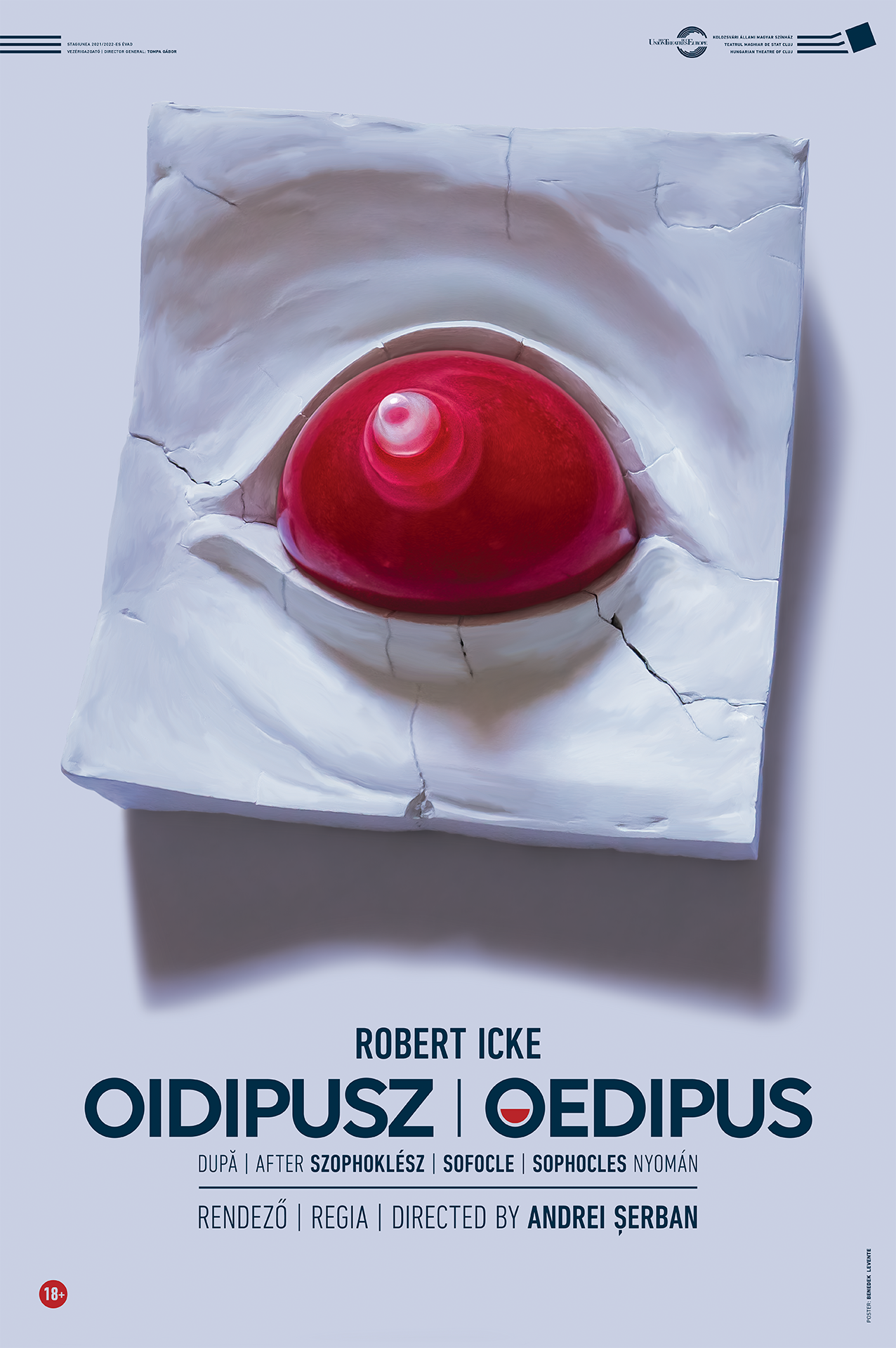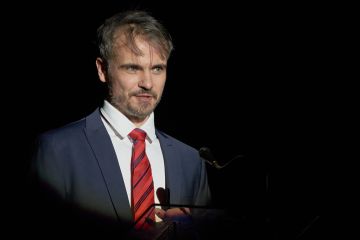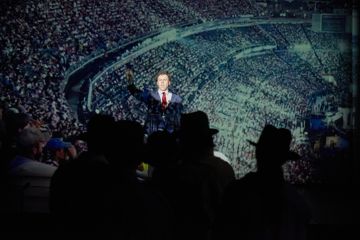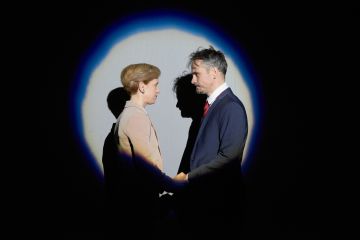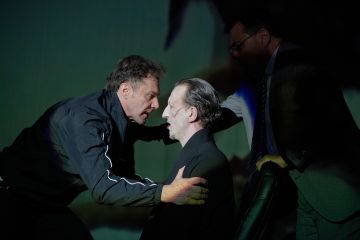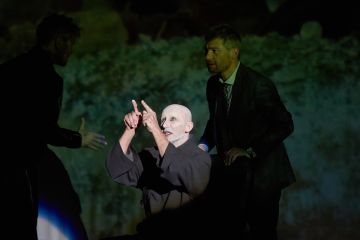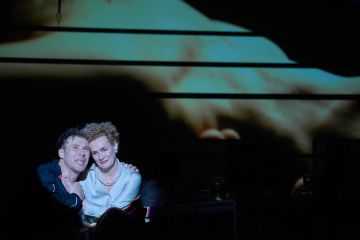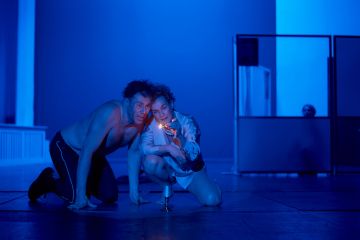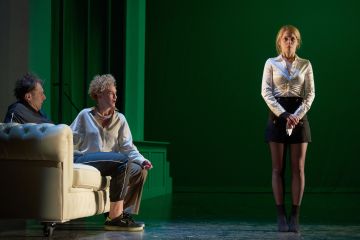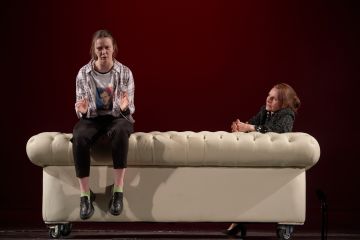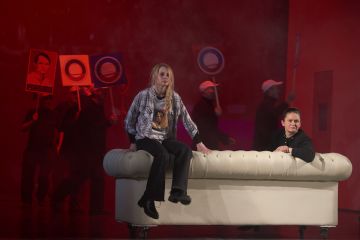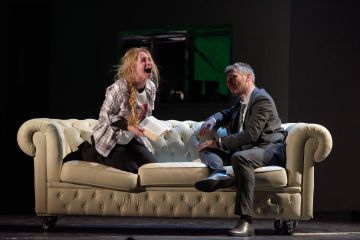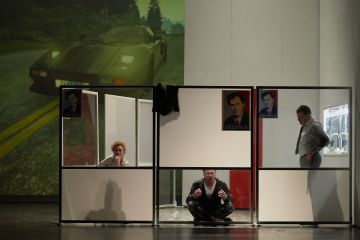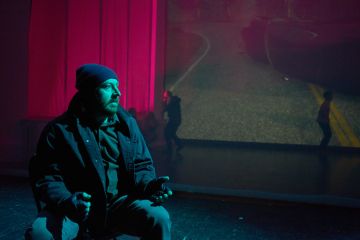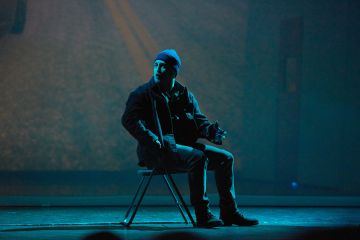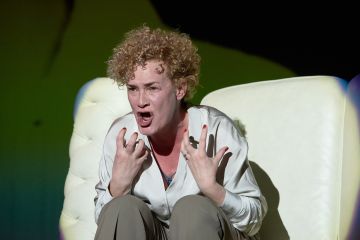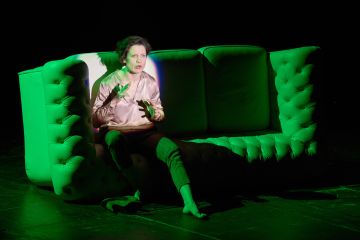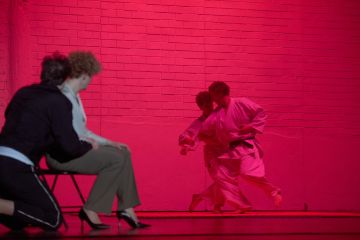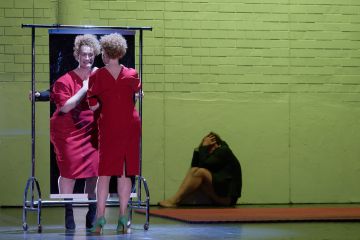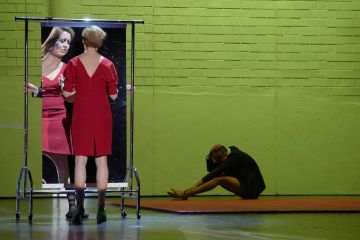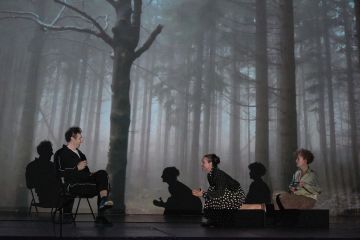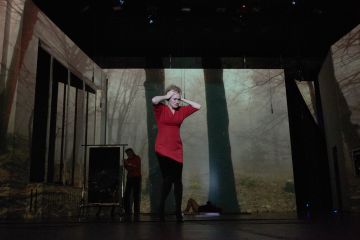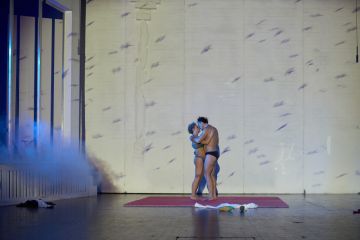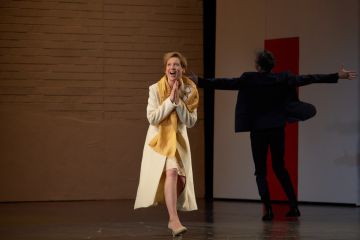In the current version of the text, which is the basis of the performance directed by Andrei Șerban, Oedipus is a politician who unknowingly killed his father in a car accident because he drove on the wrong side of the road, Laios is a pedophile who has destroyed the lives of dozens of little girls and boys, and Jocasta is a mother forced to give the child conceived at the age of thirteen up for adoption so as not to destroy the reputation of the beloved head of state. The drama of the story remains as acute thanks to carefully constructed dialogue, the acting is impeccable - precise and nuanced, sprinkled with tense scenes, inner turmoil and disturbing monologues (I saw the show with the first cast, made up up: Ervin Szűcs, Emőke Kató, Miklós Bács, Tekla Tordai, Gábor Viola, Zsuzsa Tőtszegi, Zsolt Gedő, Tamás Kiss, Áron Dimény, Eszter Román, Alpár Fogarasi, Ferencz Ádám, László Kovács, Krisztina-Hanna Fehér, Petra-Panna Kristály).
Oana Balaci: Orb în fața adevărului - Oidipusz / Oedipus [Blind to the truth - Oidipusz / Oedipus], liternet.ro, March 2022
From election posters and press boxes to the stark white wall suggesting an ancient column, or the semi-transparent panels that were lowered and raised, Carmencita Brojboiu's scenography closely serves the idea of keeping the whole scenic composition in an air of grandeur. Although Andrei Șerban said at the press conference that he doesn't usually use video projections because they kill the actor, in Oedipus video projections by Radu Daniel abound. They give the necessary amplitude both in visualising events that happen beyond the space (and time) of the stage, such as the accident that kills Laios, Oedipus' father (in Sophocles' original version these were only narrated) and in suggesting and amplifying meditations in the text such as the moment of the Sphinx in front of the oracle at Delphi or the introduction of Gustave Courbet`s painting L`origine du monde. Live music, used intermittently, tenses the action by keeping the atmosphere in a simmer bordering on delirium and despair. The dynamics of the show are ensured by the actors` performance, connected to a rhythm that is hard to keep up with, because there is always something happening on stage.
Adrian Țion: Arta teatrală sub semnul surprizei - Oidipusz / Oedipus [Theatre in the realm of surprise - Oidipusz / Oedipus], liternet.ro, March 2022
The presence of the timer at the top of the stage is disheartening, we know what it announces, we know the point of it, it is there as a symbol of the approaching election result, but it also has a subtext. It also becomes an element of comparison between performances, the show is still in a nascent, formative state (and because the Theatre's stage is shared with the Hungarian Opera of Cluj, reducing rehearsal time with in the sets), each cast has its own rhythm, its own haste, its own vision and connections, a different chemistry. That's why you can hardly be 100% at peace with having "seen a performance." Maybe a rendition. Maybe a fluke. Maybe an accident, happy or not. Even the preview that preceded the actual premiere by a week can be said to have been a performance, even if not in the canonical sense.
This show did, however, leave me crying as a nervous release. It began, I think, at the beginning of the dance scene between Oedipus and Jocasta, when the third of Tiresias' prophecies is fulfilled. And it kept me going until after the applause. And even outside the theatre. And a little bit at home. That's all, so you can see I'm all for clichés when they're understandable. Either that, or I'm slowly discovering a new fascination with contemporary dance.
Alberto Păduraru: Facerea de bine e futere de mamă și alte profeții - Oidipusz / Oedipus [Doing good is mother-fucking and other prophecies - Oidipusz / Oedipus], liternet.ro, March 2022
One by one, in the shadows, in the half-light or in the spotlight designed by Șerban, Oedipus will find out everything. Ervin Szűcs's silent play is even more impressive than when he uses speech. The character/actor is falling apart before our eyes, his plans are crumbling one after the other, changing the world is out of the question, the man knows nothing about himself, how can he influence the destiny of others?
Mihai Brezeanu: Ecce homo! - Oidipusz / Oedipus, liternet.ro, March 2022
Jocasta tells (us) what we don't want to hear or, if we do hear it, we pretend not to. Because what is to be heard is not comfortable, it is not easy and, above all, it is not simple.
Mihai Brezeanu: Et la femme créa Dieu - Oidipusz / Oedipus, liternet.ro, March 2022
I was deeply moved by Emőke Kató's monologue at the end of the play, in which she reminisces about her marriage to Laios. The actress's artistry met the director's empathy in a moment so intense that I realised the play could just as justifiably have been called Jocasta, although Ervin Szűcs played the title role impeccably. Merope was given a similar treatment, a character sometimes ridiculous in attitude but never ridiculous overall, to whom Tekla Tordai gave a very endearing dose of humanity, but which would not have been possible without the director's guidance.
(...)
The actors of the Hungarian Theatre of Cluj are not only very good but, I dare say, they can give lessons to many other companies in Bucharest. If the beginning of 2022 lacked a big event, I am happy to discover that this major cultural event has happened in Cluj.
Alexandru Pătrașcu: Oedipus, marea premieră post pandemică de la Cluj [Oedipus, the great post-pandemic premiere in Cluj], adevarul.ro, March 11, 2022
A performance with two casts, both excellently thought out. Andrei Șerban is at his fourth performance with the company of the Hungarian Theatre of Cluj, which explains how he thought up the two casts. Basically, we have two different shows with the same text; there is no first and second cast, but two equal casts. I was happy to find the actors of the young generation of the theatre perfectly integrated in the company, and they are confirming this with each new performance. Although I am tempted to nominate and name actors who have made me happy, I prefer to confirm what Andrei Șerban said at the end of the first evening: the troupe of the Hungarian Theatre of Cluj is the best in the country today. What more could you wish for than to see them all perform in a demanding show that raises questions and dilemmas you thought had been resolved long ago? Oedipus at the Hungarian Theatre of Cluj, directed by Andrei Șerban.
Nona Rapotan: Oedipus și obsesia pentru adevăr [Oedipus and the obsession for truth], bookhub.ro, 13 March 2022
"Oedipus" directed by Andrei Șerban is the performance that resonates perfectly with our guilt of searching for the truth in the amount of information we let ourselves drown in. We ourselves are Oedipus; and "Here I am myself", equally selfish and equally sinful. Art for art's sake and art for the sake of the message become one and the same on the stage of the Hungarian Theatre of Cluj: the art of theatre.
Alina Epîngeac: Andrei Şerban spune adevărul despre „Oedipus” [Andrei Serban tells the truth about "Oedipus"], epingeac.com, 14 March 2022
Andrei Serban's Oedipus is one of the most powerful performances staged in our theatre in recent seasons. Through the topicality of its message, its repertory proposal and its scenic decipherment, Sophocles' retelling works for audiences of all ages, using fresh, accessible, exciting conventions, remaining faithful to the great ancient themes, preserving their meaning and message. The production of the Hungarian Theatre of Cluj brings us a company whose performance is at the highest level, trained for many years by working and meeting great directors. You leave Cluj with the feeling that you have escaped to a protected theatrical island, where performance is normality and artistic quality a natural consequence.
Cristiana Gavrilă: Oedipus. Despre aroganța de a pretinde adevărul [Oedipus. On the arrogance of demanding the truth], optmotive.ro, 21 March 2022
It is a great joy to see the actors of the Hungarian Theatre in Cluj perform, and the roles they play in this show are nuanced, with complex and difficult parts that they perform successfully. It should be mentioned that the show benefits from a double cast which certainly lends it other interpretative areas with distinct energies. The music is important in the economy of the show, it not only marks the passages, it resonates familiar to the ears, but the lyrics are always given additional meanings. Carmencita Brojboiu's scenography supports the construction of the show and enhances its interpretations. Andrei Șerban proposes an Oedipus that brings us face to face with the great questions, to which he lends contemporary topicality, but also the depth identity themes, with the appeal to hubris, to destiny, to guilt, with the power of the myth and the flowing energies it brings.
Daniela Șilindean: Cu Oedip la urne [With Oedipus at the ballot box], Orizont, No. 3 (1679), Year XXXIV, March 2022
Andrei Șerban transforms the stage into an insular space: a translucent shell that we can look at like a miraculous and terrifying crystal ball. Mechanisms of exemplary rigour are forged, with visible and invisible cogwheels, with vibratory combinations that measure emotion and dose the energy and vital pulsation of the actors to the last fiber. Composed as a parable of history lived as an individual, repetitive tragic destiny, Andrei Serban's Oedipus is a story about what happens when you are no longer blind.
(...)
What is impressive is the manner in which the group dynamics of the performance evolve like a perfectly calibrated flock of birds. The director's invisible hand is there, scattered in the dozens of performances rendered with clockwork precision. Carmencita Brojboiu's scenography and Radu Daniel's video inserts, Dana Dima's irreplaceable creative collaboration are all layers of the same bright source of inspiration.
Such an exemplary staging could not have been made in Romania in any other theatre than the Hungarian Theatre of Cluj. Because only here the vision of a very important director and company director (Tompa Gábor) is combined with the indispensable tools of a lasting theatrical construction: company, professionalism, adapted stage space.
Corina Șuteu: Maestrul orologiilor [Master of Clocks], Orizont, No. 3 (1679), Year XXXIV, March 2022
Watching the performers of the two casts you notice that, under the director's guidance, all the roles are fulfilled, the role’s arc, its character rigorously charted. The difference is talent, technique, experience. Those chosen in the first cast are, for the most part, experienced, strong actors. The second cast relies on youth, on a more alert performance. Both are worth seeing.
A very lively, tense performance. We watched for over two hours, moved, surprised, in great concentration, the excellent alternating performances of the performers of the two casts. An extremely contemporary performance, which will make us, perhaps, as Andrei Șerban says, understand ourselves better, to dig deeper inside ourselves before it is too late...
Roxana Croitoru: Extrem contemporan [Extremely Contemporary], Teatrul Azi, Issues 5-6/2022
The performance is indeed capable of moving us out of the comfortable position of knowing the mythic circle or the original tragedy. On stage, we see a presidential candidate striving for absolute honesty, spending the hours before the results are announced with his family. The children are rebellious teenagers, the (foster) mother being unable to keep up with the outspokenness and altered morality of the young people. We see familiar family situations so commonplace that the outcome we know will happen is unimaginable.
Réka Fazakas: Mit bízunk a képzeltre? [What do we entrust to the imagination?], szinhaz.net, 21.04.2022












